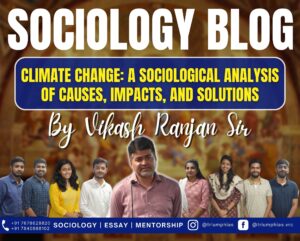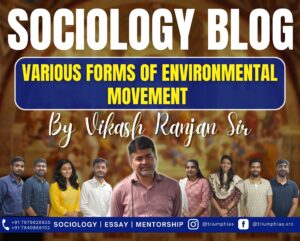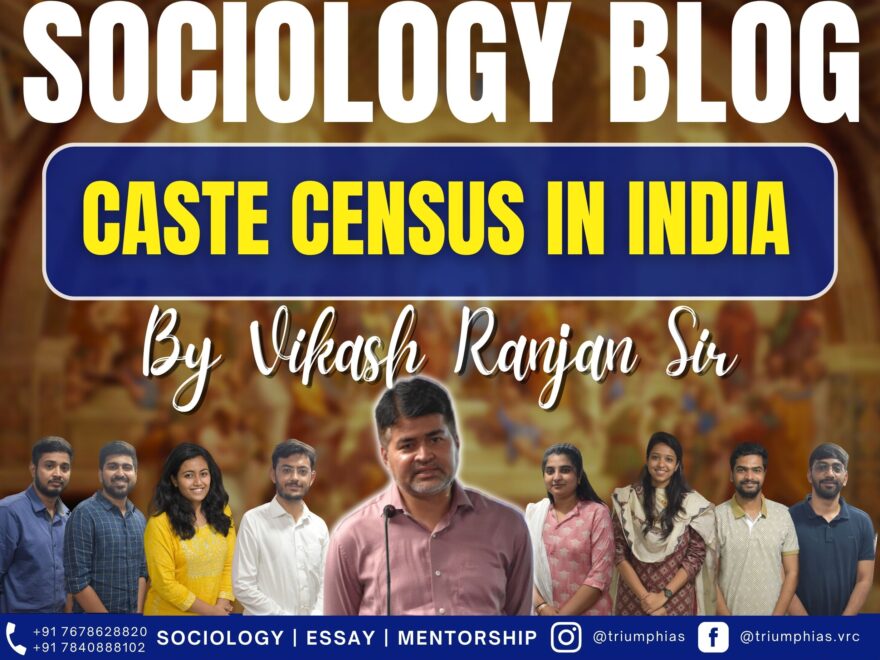Caste Census in India
(Relevant for Sociology Optional for Civil Services Examination)

Caste Census
Context: The Supreme Court has refused to entertain various pleas challenging the Bihar Government’s notification to conduct a caste-based census in the state
SOCIOLOGICL ANALYSIS OF CASTE CENSUS
- N.Srinivas: caste census does not reflect social realities . Some has used it for secular and ritual mobility.
- Ander Beteille : caste is a device of political manipulation .
- Yogendra Singh: already many committee and commissions reports are laying in dust, there are least chances that csste census will be used for benefit.
- L. Sharma: caste as a form of structure / system of society has changed to caste as a form of identity .
- Louis Dumont: caste is passport to politics in India.
- Christophe Jaffrelot – A caste census would assist in mapping political representation and allowing for the better inclusion of underrepresented groups.
- Satish Despande – the caste-based census would make visible “the most powerful and most pampered minority: the upper caste
- Scholars like Sudipta Kaviraj, Arjun Appadurai have argued about the constitutive role of official statistical records. In order to abolish caste, caste-based discrimination, caste-based distribution of wealth and socio-cultural inequalities generated by caste it is essential to understand its expansiveness.
What Is Caste Census?
- The Caste Census is a comprehensive enumeration and collection of demographic and socio-economic information on the Indian population, specifically focusing on caste affiliations.
- It is aimed at understanding the complex societal structure, capturing inequalities, and providing data for policy formulation.
History of Caste Census:
- The Indian census started in 1881 during colonial times and evolved over the years.
- First Caste Census: The Socio-Economic and Caste Census (SECC) was conducted in 1931, aiming to capture economic status and caste information.
- Census vs. SECC: While the census provides a population portrait, SECC identifies beneficiaries of state support, and its data is open for government use.
Need for Caste Census:
- Policy Insights: A caste census offers a detailed understanding of societal issues beyond reservations, aiding policymakers in devising effective strategies and addressing marginalized populations.
- Revealing Privilege: Caste isn’t only about disadvantage; it also encompasses privilege and advantage, necessitating a comprehensive data collection.
- Caste’s Importance: As caste holds a prominent place in Indian society, profiling all castes is essential to grasp societal dynamics accurately.
- Addressing Inequalities: Caste census enables a scientific and democratic approach to address wealth, resource, and education disparities.
- Proper Estimate For The Population Of OBCs: There is no proper estimate for the population of OBCs, various groups within the OBCs, and others. Mandal Commission estimated the OBC population at 52% while political parties make their own estimates.
- Constitutional Mandate: The Constitution mandates investigations into socially and educationally backward classes, aligning with caste census objectives.
- Debunking Myths: Caste census can dispel misconceptions, fostering a more informed and inclusive society.
- Research: Caste-based census data can be used by researchers to study various aspects of social, economic, and political life in India.
Disadvantages of Caste Census:
- Political and Social Repercussions: Caste census might solidify identities, promoting caste-based political mobilization and strong sentiments for or against reservations.
- Context-Specific Discrimination: Caste’s embedded discrimination can be hard to measure and may not correlate with class or deprivation.
- Lack of Trust and Clarity: Historical mistrust and data availability issues hinder caste-based data collection.
Challenges of Caste Census:
- Emotive Element: Caste census holds political and social implications, potentially hardening identities and sparking resistance.
- Data Reliability: Concerns over data accuracy and privacy have led to partial release of SECC data.
- Complex Discrimination: Caste is distinct from class and challenging to quantify due to entrenched societal biases.
- Privacy concerns: Collecting caste-based data raises concerns about the privacy of individuals and their right to not disclose their caste identity
Way Forward:
- Leverage Existing Data: Link Census and SECC data with other datasets like National Sample Surveys for comprehensive analysis.
- Embrace Digital Methods: Employ modern, inclusive, and non-discriminatory digital alternatives for data collection.
- Preliminary Studies: Conduct socio-anthropological studies at state and district levels to establish sects and sub-castes present in the population.
Census: method of data collection
Definition: The census method encompasses a comprehensive process of gathering, organizing, analyzing, evaluating, disseminating, and publishing statistical data pertaining to the population and its attributes.
Importance of Census Method:
- Data Compilation: Census provides valuable insights into economic activity, literacy, education, housing, urbanization, fertility, mortality, scheduled castes, scheduled tribes, language, religion, and migration.
- Historical Context: Historical references like ‘Arthashastra by Kautilya’ and ‘Ain-e-Akbari’ emphasize population statistics as a state policy tool dating back to 3 BC, shedding light on industry and wealth.
Research Facilitation:
- Population Study: Census data enables research on urban-rural distribution, urban area growth, geographical population distribution by occupation and education, as well as age and gender structures.
Example: Census 1971 introduced fertility-related inquiries for currently married women.
Vital Information Source:
- Migration and Demographics: Census contributes crucial data on migration, birth and death rates, fertility rates, and gross/net birth rates.
Example: Census of 1921 recorded a population decline of 0.31% during 1911-21 due to the 1918 flu pandemic.
Challenges of Census:
- High Expenses: Conducting a census involves substantial financial outlay.
- Accuracy Concerns: Prone to errors in content and coverage.
- Misrepresentation: False information may be furnished due to fears of losing government benefits, citizenship status (Citizenship Amendment Act), and limited education.
- Data Security: Ensuring secure data storage and application, especially with the transition to digital collection (e.g., 2021 census).
- Potential Misuse: Possibility of government officials misusing comprehensive family data, raising concerns, especially for vulnerable groups like the transgender community.
Human Resource Limitations: Insufficient training for enumerators, which can impact data quality.
Sample Questions for UPSC Sociology Optional Paper:
What is the Caste Census and why is it significant?
The Caste Census is a demographic survey focused on caste affiliations in India to aid policy formulation and address inequalities.
What is the primary difference between the general Census and SECC?
General Census provides overall population statistics, while SECC identifies beneficiaries for state support and captures caste data.
What drawbacks are associated with the Caste Census?
It can harden caste identities, lead to political mobilization based on caste, and raise privacy concerns.
What did the Mandal Commission estimate about the OBC population?
The Mandal Commission estimated that OBCs make up 52% of the Indian population.
What did N. Srinivas mean by “caste census does not reflect social realities”?
He implied that caste census may not capture the nuanced social and cultural dynamics of caste in India.
Why are there concerns about data reliability in Caste Census?
Due to historical mistrust and potential inaccuracies in reporting.
How can a Caste Census help in debunking myths?
It can provide empirical data to challenge prevalent stereotypes and misconceptions about caste groups.
What is Christophe Jaffrelot’s view on the caste census?
He believes it would assist in mapping political representation and improving the inclusion of underrepresented groups.
What challenge does the Caste Census pose concerning privacy?
Collecting caste-based data can intrude on individual privacy rights and the choice not to disclose one’s caste
what are constraints in conducting the such census ?
it requires huge finances , trained manpower , time consuming exercise.
Related Blogs
 |
 |

To master these intricacies and fare well in the Sociology Optional Syllabus, aspiring sociologists might benefit from guidance by the Best Sociology Optional Teacher and participation in the Best Sociology Optional Coaching. These avenues provide comprehensive assistance, ensuring a solid understanding of sociology’s diverse methodologies and techniques.
META TAGS:
Caste Census, Indian Population, Sociological Analysis, Policy Insights, SECC, M. N. Srinivas, Yogendra Singh, Satish Despande, Christophe Jaffrelot, caste-based discrimination, population study, Constitutional Mandate, caste identity, demographic data, Accuracy Concerns, Human Resource Limitations, Potential Misuse, Misrepresentation, Need for Caste Census, Disadvantages of Caste Census, Challenges of Caste Census
Explore Sociology Optional Syllabus
Paper-1
FUNDAMENTALS OF SOCIOLOGY
- Sociology – The Discipline
- Sociology as Science:
- Research Methods and Analysis:
- Sociological Thinkers:
- Karl Marx- Historical materialism, mode of production, alienation, class struggle.
- Emile Durkheim- Division of labour, social fact, suicide, religion and society.
- Max Weber- Social action, ideal types, authority, bureaucracy, protestant ethic and the spirit of capitalism.
- Talcott Parsons- Social system, pattern variables.
- Robert K. Merton- Latent and manifest functions, conformity and deviance, reference groups.
- Mead – Self and identity.
- Stratification and Mobility:
- Concepts- equality, inequality, hierarchy, exclusion, poverty and deprivation.
- Theories of social stratification- Structural functionalist theory, Marxist theory, Weberian theory.
- Dimensions – Social stratification of class, status groups, gender, ethnicity and race.
- Social mobility- open and closed systems, types of mobility, sources and causes of mobility.
- Works and Economic Life:
- Social organization of work in different types of society- slave society, feudal society, industrial /capitalist society
- Formal and informal organization of work.
- Labour and society.
- Politics and Society:
- Sociological theories of power.
- Power elite, bureaucracy, pressure groups, and political parties.
- Nation, state, citizenship, democracy, civil society, ideology.
- Protest, agitation, social movements, collective action, revolution.
- Religion and Society:
- Sociological theories of religion.
- Types of religious practices: animism, monism, pluralism, sects, cults.
- Religion in modern society: religion and science, secularization, religious revivalism, fundamentalism.
- Systems of Kinship:
- Family, household, marriage.
- Types and forms of family.
- Lineage and descent.
- Patriarchy and sexual division of labour.
- Contemporary trends.
- Social Change in Modern Society:
- Sociological theories of social change.
- Development and dependency.
- Agents of social change.
- Education and social change.
- Science, technology and social change.
Paper-2
INDIAN SOCIETY: STRUCTURE AND CHANGE
INTRODUCING INDIAN SOCIETY
- Perspectives on the study of Indian society:
- Indology (GS. Ghurye).
- Structural functionalism (M N Srinivas).
- Marxist sociology (A R Desai).
- Impact of colonial rule on Indian society :
- Social background of Indian nationalism.
- Modernization of Indian tradition.
- Protests and movements during the colonial period.
- Social reforms.
SOCIAL STRUCTURE
- Perspectives on the study of Indian society:
- The idea of Indian village and village studies.
- Agrarian social structure – evolution of land tenure system, land reforms.
- Caste System:
- Perspectives on the study of caste systems: GS Ghurye, M N Srinivas, Louis Dumont, Andre Beteille.
- Features of caste system.
- Untouchability – forms and perspectives.
- Tribal communities in India
- Definitional problems.
- Geographical spread.
- Colonial policies and tribes.
- Issues of integration and autonomy.
- Social Classes in India:
-
- Agrarian class structure.
-
-
- Industrial class structure.
- Middle classes in India.
-
- Systems of Kinship in India:
- Lineage and descent in India.
- Types of kinship systems.
- Family and marriage in India.
- Household dimensions of the family.
- Patriarchy, entitlements and sexual division of labour
- Religion and Society:
- Religious communities in India.
- Problems of religious minorities.
- Patriarchy, entitlements and sexual division of labour
SOCIAL CHANGES IN INDIA
- Visions of Social Change in India:
- Idea of development planning and mixed economy
- Constitution, law and social change.
- Education and social change.
- Rural and Agrarian transformation in India:
- Programmes of rural development, Community Development Programme, cooperatives,poverty alleviation schemes
- Green revolution and social change.
- Changing modes of production in Indian agriculture.
- Problems of rural labour, bondage, migration.
3. Industrialization and Urbanisation in India:
-
- Evolution of modern industry in India.
- Growth of urban settlements in India.
- Working class: structure, growth, class mobilization.
- Informal sector, child labour
- Slums and deprivation in urban areas.
4. Politics and Society:
-
- Nation, democracy and citizenship.
- Political parties, pressure groups , social and political elite
- Regionalism and decentralization of power.
- Secularization
5. Social Movements in Modern India:
-
- Peasants and farmers movements.
- Women’s movement.
- Backward classes & Dalit movement.
- Environmental movements.
- Ethnicity and Identity movements.
6. Population Dynamics:
-
- Population size, growth, composition and distribution
- Components of population growth: birth, death, migration.
- Population policy and family planning.
- Emerging issues: ageing, sex ratios, child and infant mortality, reproductive health.
7. Challenges of Social Transformation:
-
- Crisis of development: displacement, environmental problems and sustainability
- Poverty, deprivation and inequalities.
- Violence against women.
- Caste conflicts.
- Ethnic conflicts, communalism, religious revivalism.
- Illiteracy and disparities in education.
Why Vikash Ranjan’s Classes for Sociology?
Proper guidance and assistance are required to learn the skill of interlinking current happenings with the conventional topics. VIKASH RANJAN SIR at TRIUMPH IAS guides students according to the Recent Trends of UPSC, making him the Best Sociology Teacher for Sociology Optional UPSC.
At Triumph IAS, the Best Sociology Optional Coaching platform, we not only provide the best study material and applied classes for Sociology for IAS but also conduct regular assignments and class tests to assess candidates’ writing skills and understanding of the subject.
Choose The Best Sociology Optional Teacher for IAS Preparation?
At the beginning of the journey for Civil Services Examination preparation, many students face a pivotal decision – selecting their optional subject. Questions such as “which optional subject is the best?” and “which optional subject is the most scoring?” frequently come to mind. Choosing the right optional subject, like choosing the best sociology optional teacher, is a subjective yet vital step that requires a thoughtful decision based on facts. A misstep in this crucial decision can indeed prove disastrous.
Ever since the exam pattern was revamped in 2013, the UPSC has eliminated the need for a second optional subject. Now, candidates have to choose only one optional subject for the UPSC Mains, which has two papers of 250 marks each. One of the compelling choices for many has been the sociology optional. However, it’s strongly advised to decide on your optional subject for mains well ahead of time to get sufficient time to complete the syllabus. After all, most students score similarly in General Studies Papers; it’s the score in the optional subject & essay that contributes significantly to the final selection.
“A sound strategy does not rely solely on the popular
Opinion of toppers or famous YouTubers cum teachers.”
It requires understanding one’s ability, interest, and the relevance of the subject, not just for the exam but also for life in general. Hence, when selecting the best sociology teacher, one must consider the usefulness of sociology optional coaching in General Studies, Essay, and Personality Test.
The choice of the optional subject should be based on objective criteria, such as the nature, scope, and size of the syllabus, uniformity and stability in the question pattern, relevance of the syllabic content in daily life in society, and the availability of study material and guidance. For example, choosing the best sociology optional coaching can ensure access to top-quality study materials and experienced teachers. Always remember, the approach of the UPSC optional subject differs from your academic studies of subjects. Therefore, before settling for sociology optional, you need to analyze the syllabus, previous years’ pattern, subject requirements (be it ideal, visionary, numerical, conceptual theoretical), and your comfort level with the subject.
This decision marks a critical point in your UPSC – CSE journey, potentially determining your success in a career in IAS/Civil Services. Therefore, it’s crucial to choose wisely, whether it’s the optional subject or the best sociology optional teacher. Always base your decision on accurate facts, and never let your emotional biases guide your choices. After all, the search for the best sociology optional coaching is about finding the perfect fit for your unique academic needs and aspirations.
Follow us :
🔎 https://www.instagram.com/triumphias
🔎https://www.youtube.com/c/TriumphIAS
https://t.me/VikashRanjanSociology
Find More Blogs
|
Scope of the subject and comparison with other social sciences |
|||
|
|
|
|
Modernity and social changes in Europe |



One comment